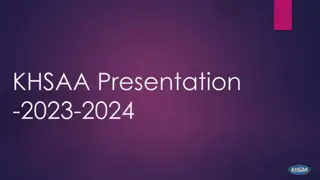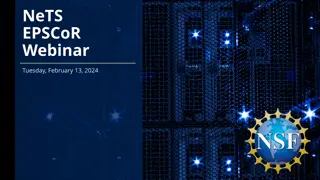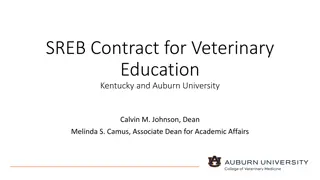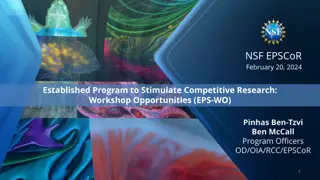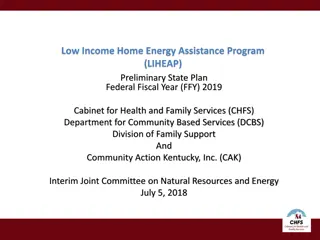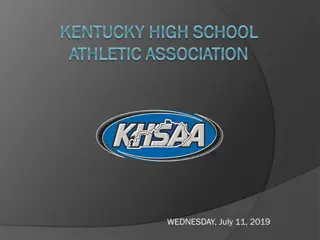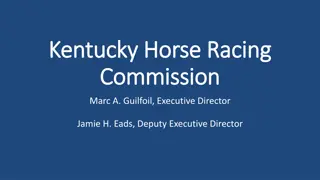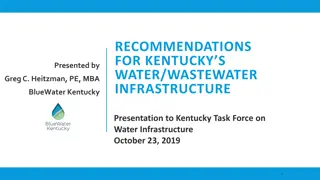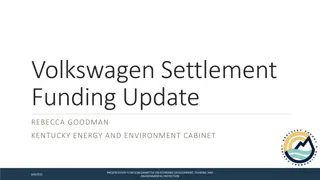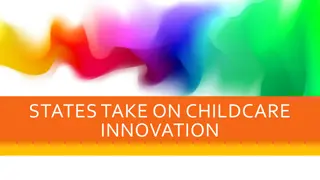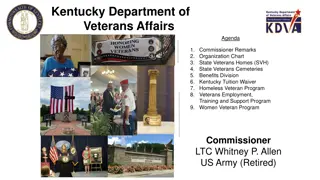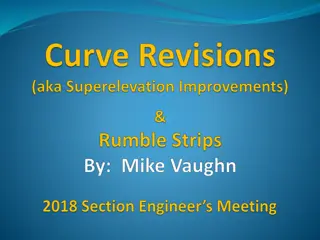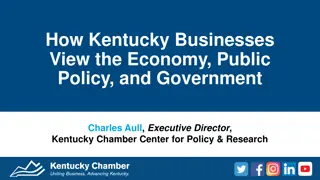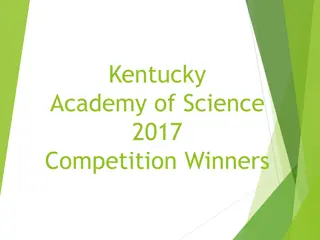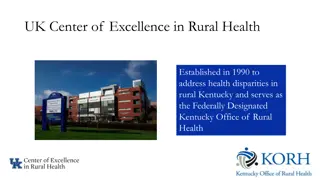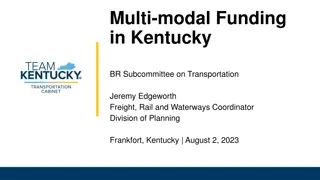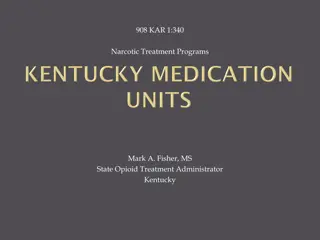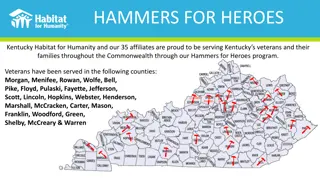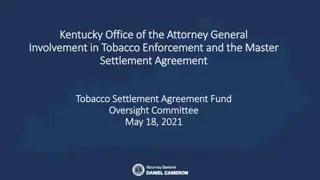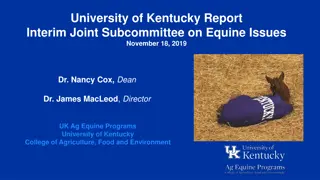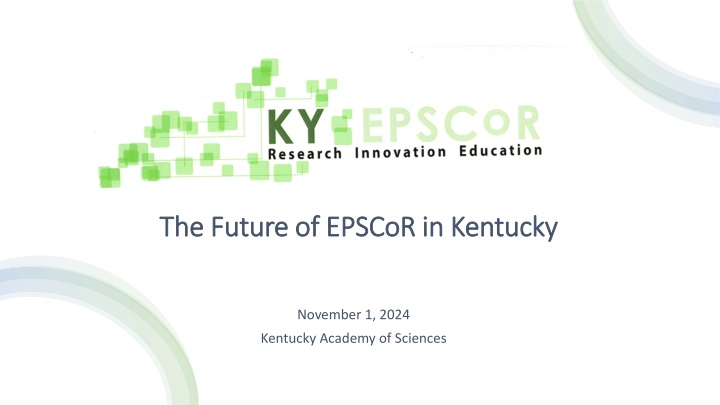
Future of EPSCoR in Kentucky - Establishing Research Programs
The EPSCoR program in Kentucky plays a crucial role in stimulating competitive research and creating high-tech jobs. Learn about its establishment, governance, objectives, and impact on economic development.
Download Presentation

Please find below an Image/Link to download the presentation.
The content on the website is provided AS IS for your information and personal use only. It may not be sold, licensed, or shared on other websites without obtaining consent from the author. If you encounter any issues during the download, it is possible that the publisher has removed the file from their server.
You are allowed to download the files provided on this website for personal or commercial use, subject to the condition that they are used lawfully. All files are the property of their respective owners.
The content on the website is provided AS IS for your information and personal use only. It may not be sold, licensed, or shared on other websites without obtaining consent from the author.
E N D
Presentation Transcript
The Future of The Future of EPSCoR EPSCoR in Kentucky in Kentucky November 1, 2024 Kentucky Academy of Sciences
Kentucky Established Program to Stimulate Competitive Research Why EPSCoR was established. Programs involved: National Science Foundation (NSF) EPSCoR, National Aeronautic and Space Administration (NASA KY), Department of Energy (DEPSCoR), Department of Defense EPSCoR (DoD EPSCoR), US Dept. of Agriculture EPSCoR, and National Institutes of Health/Institutional Development Award (NIH/IDeA). Governance - Statewide EPSCoR Committee Jurisdictional Steering Committee responsible for Statewide Science and Technology Plan prepared in partnership with the CED long term economic development strategy in STEM areas important to the Commonwealth s future economic position. Return on investment: on average $1 state: $17 Federal and other sources. 2,000 high tech, high pay jobs including start-up companies have been created.
Why EPSCoR was created To help states and jurisdictions successfully compete for Federal research dollars. (EPSCoR states and jurisdictions get only 10% of NSF research budget). Designed to build research infrastructure (people, facilities, students). NSF requires research that is tied to economic development in the Commonwealth via a Science and Technology Plan. VISION 2030
Kentucky Statewide Committee Jurisdictional Steering Commitee Requirement by NSF and other agencies Encourage a rigorous, cross-university process Encourage collaboration between research agency subcommittees Encourage collaboration between UK, UofL, Comprehensives, KCTCS and independent colleges and universities Members UK and UL administrators, research faculty at all universities, industry.
NSF NSF EPSCoR EPSCoR - - Current and Historical (Track 1) Current and Historical (Track 1) NSF Track 1 (43 years at NSF; 25+ years in Kentucky) $20M + $4M state match Seed funding in KY comes from state match Five-year cycle around a central theme May 15, 2023 NSF Announcement of Sunset of Track 1 Program NSF Announcement of E-CORE and E-RISE programs
NSF NSF EPSCoR EPSCoR Two significant factors Two significant factors NSF Envisioning the Future of EPSCoR Report released August 2022 Increasing access Increasing capacity recommendations CHIPS Act This legislation guarantees that EPSCoR jurisdictions receive 20% of all R&D funding for the National Science Foundation, up from the current 13%.
Kentucky NSF Kentucky NSF EPSCoR EPSCoR Track 1 Update Track 1 Update Current and Historical Status Development of next Track 1 application Submitted August 2023 CHARGE (Climate Change Hazards in Appalachia) Kentucky Science and Technology Plan Final and only submission window for NSF Track 1 Program
E E- -CORE CORE Collaborations for Optimizing Research Ecosystems Research Infrastructure Improvement December 2023 (July 2024+) $2M/year with a four-year cycle with no match required Renewable once for four-year cycle (match?) Development of fundamental capacity Research facilities; higher education pathways; STEM education (K-16) pathways; broadening participation; workforce development; national and global partnerships; community engagement and outreach; economic development and use-inspired research; and/or early career research trainee pathways 5% to EPSCoR jurisdictional statewide committee
E E- -RISE RISE Research Incubators for STEM Excellence Research Infrastructure Improvement January 2024 (August 2024+) $1.75M/year with a four-year cycle with no match required Renewable once for three years (match?) Development of Research Projects incubation of research teams and products to support the development and implementation of sustainable broad networks of individuals, institutions, and organizations that will transform the science, technology, engineering and mathematics (STEM) research capacity and competitiveness in a jurisdiction within the chosen field of research.
Track 1 overlap with E Track 1 overlap with E- -CORE and E CORE and E- -RISE RISE As of 2023, all Track 1 efforts pivoted Depended on where jurisdictions were in their five-year cycle Year 1-3 No overlap Year 4 (Kentucky + 9 other jurisdictions) Year 5 (Resubmit Track 1 or move solely to E-CORE and E-RISE) Kentucky S&T Plan alignment required for Track 1, E-CORE and E-RISE Vision 2030 completed in July 2023. Eligibility to lead and be funded under E-CORE and E-RISE guidelines is complicated if there is a current Track 1.
Kentucky NSF Kentucky NSF EPSCoR EPSCoR Track 1, E Track 1, E- -Core, E Core, E- -Rise Results Rise Results Track 1 - CLIMBS - Climate Resilience through Multidisciplinary Big Data Learning, Prediction, and Building Response Systems 2024-2029 E-CORE CAPTIVATE Pending E-RISE DARE KY Driving AgriTech Research and Education in Kentucky 2024-2028
KY NSF EPSCoR Overview The vision of the KY NSF EPSCoR is to develop long-term improvements in scientific discovery, innovation and education throughout the Commonwealth.
KY NSF EPSCoR Seed Funding Programs Research Award (RA) Undergraduate Research Experience (URE) Education, Outreach, & Communication (EOC) March 14, 2025 Deadline
Research Award (RA) The Research Award program is designed to assist faculty with new or existing research projects to be competitive as a future proposal submitted directly to the National Science Foundation (NSF). Faculty seed funding Maximum request is $50,000 (direct costs) Follow on submission to NSF is required
Undergraduate Research Experience (URE) The Undergraduate Research Experience Program provides funding for faculty- mentored research projects for underrepresented undergraduate students in STEM fields. Undergraduate student focused Maximum request is $7,500/student (direct costs) Up to 2 students may be supported
Education, Outreach, & Communication (EOC) The Education, Outreach, & Communication program provides support funding for individuals and organizations across the state seeking to engage students and citizens in Advanced Manufacturing STEM topics. Supports STEM outreach including: Workshops After-school clubs Conferences Camps And other Advanced Manufacturing STEM events and activities Maximum request is $10,000 (direct costs)
The DARE-KY Project at KYSU Janelle Hager, Leo Fleckenstein, and Avinash Tope College of Agriculture, Health, and Natural Resources Kentucky State University NSF Award: 2416939
Project Vision Overarching goals of DARE-KY: 1. Make Kentucky an epicenter of AgTech (high-tech agriculture) knowledge in the US 2. Create a state-wide network of research and development (R&D) for soilless agriculture (hydroponics and aquaponics) 3. Integrate new academic and workforce development opportunities into R&D efforts that will result in a more diverse, highly trained workforce 4. Use this network to investigate a research question relevant to soilless agriculture "In DARE-KY, we will build a long-term, viable network for research, education, and workforce development in soilless AgTech by increasing research capacity, expanding opportunities, and improving sustainability of agriculture."
Primary Project Partners Serve as center of research network Facilitate knowledge transfer to partner institutions Develop new curricula in soilless agriculture Establish new research systems Develop new courses for high-tech agriculture Establish new research systems Lead K-12 project- based learning initiatives. Network between partners and industry Connect students to opportunities Build new greenhouse for WFD Develop new courses in soilless ag, increase number of 2+2 transfers to KSU
KY INBRE IDeA Network of Biomedical Research Excellence Recent Statewide Award 2024 2029 ($20M) Many Funding opportunities: https://www.kyinbre.org/funding Research and Pilot Project Awards Student Research Program Faculty Start-Up Awards
DOE EPSCoR : DOE EPSCoR supports early stage research across a wide range of DOE program areas. The goals of DOE EPSCoR are to: a) improve the capability of designated states and territories to conduct sustainable and nationally competitive energy-related research; b) establish foundational research capabilities in designated states and territories through increased human and technical resources, training scientists and engineers in energy-related areas; and c) build beneficial relationships between scientists and engineers in the designated states and territories with the 10 world-class laboratories managed by the Office of Science, leverage DOE national user facilities, and take advantage of opportunities for intellectual collaboration across the DOE system. DOE EPSCoR is a science-driven, merit-based program that supports early stage research activities spanning the broad range of science and technology programs within DOE.
KY DOE EPSCoR Recent success: DOE-EPSCoR Implementation Grant program (July 2023). Project award of $2.75 million to University of Kentucky for the project: Understanding how materials selection and pattern geometry impact light- matter interactions in nanoscale magnets arrays , lead: Todd Hastings, University of Kentucky. The grant also includes involvement of Transylvania University, Centre College, and University of Delaware. DOE goals for Implementation Grants are to improve research capability through the support of a group of scientists and engineers working on a common scientific theme.
Many Unknowns Many Unknowns Continuously evolving NSF EPSCoR environment New challenges and benefits We are the BEST environment for faculty in EPSCoR jurisdictions to apply for NSF funding

